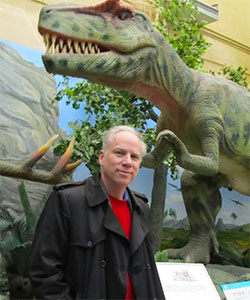7 Things About Calvin Johnson
Calvin Johnson is a physics professor with a flair for science fiction.

Calvin Johnson is a professor in San Diego State University's Department of Physics.
"My research is in theoretical nuclear physics. I model the quantum structure of atomic nuclei using very large matrices on supercomputers," Johnson said. "As such, I work a lot with United States national labs, as well as occasionally travel to national and international conferences."
Johnson occasionally writes science fiction stories, and has had about a dozen published.

"Science fiction, in my view, isn't so much about science but about our relationship to science. It's also about our relationship to history — because science fiction implicitly assumes a different history — even if its a history-yet-to-come, from the one we know," he said.
1. What inspired you to do this kind of work?
When I was a small child, I was enamored of dinosaurs and wanted to be a paleontologist. But paleontology requires long trips into the desert, or hanging off cliffs digging out bones and I wasn't sure I wanted to do that. After dinosaurs, I most liked atoms and lasers and things like that, so I became enamored with physics.
2. How long have you worked at SDSU?
Thirteen years.
3. What is the best piece of advice you ever received?
“Choose projects for which you have an unfair advantage," such as projects for which you have more knowledge or skill or experience than others. Part of an education is developing those "unfair advantages."
4. What is your favorite thing about your job?
I like thinking about things. And then telling people about it.
5. What about your field or position do you think would surprise people the most?
Most scientists do not work on "big ideas" or "theories of everything." We work on small technical details in obscure corners. Big ideas are surprisingly easy to come up with; getting enough technical details right to show your big idea is right, or at least not very wrong, is hard. And to succeed in any field of science you have to love the details. This, incidentally, is also what is hard about poetry and fiction and all the arts: big conceptual ideas are easy, translating them into a finished product with all the details just right is hard.
6. What is the most interesting or surprising thing about you?
I write poetry and have had two dozen poems published in magazines. I've even won money in a poetry slam in a bar in Baton Rouge.
7. If you could only rescue one thing from your burning office, what would it be?
The Valentine's Day notes from my wife.



